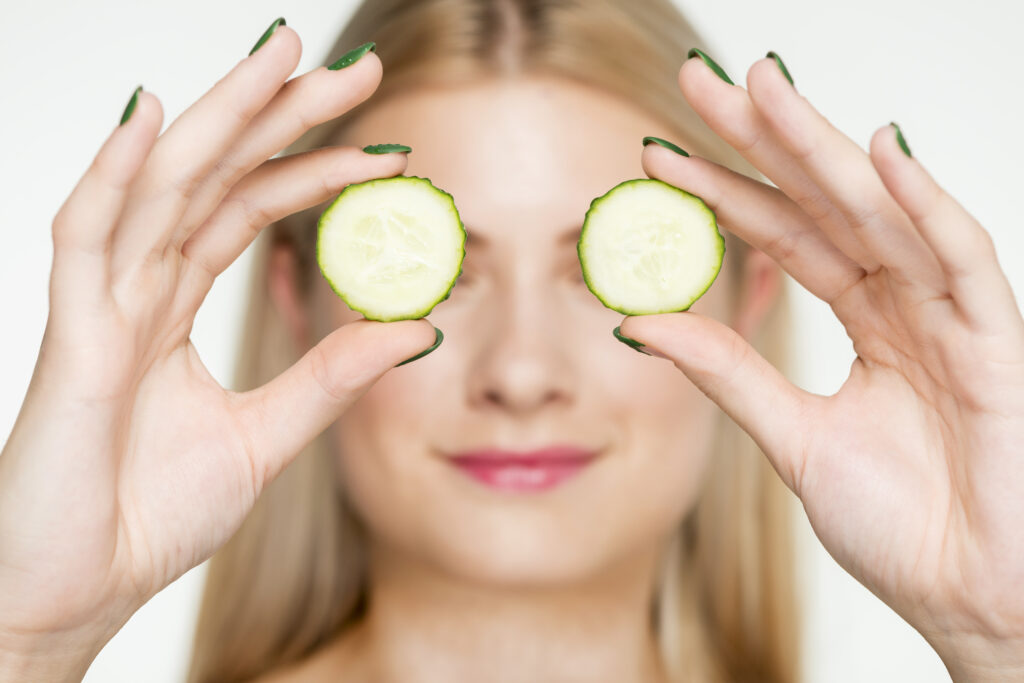
Skin elasticity refers to your skin’s ability to stretch and return to its original shape. It keeps your skin firm, youthful, and radiant. Aging, sun exposure, and lifestyle choices can all contribute to a loss of elasticity, resulting in sagging and wrinkles.
What is the good news? Skin elasticity can be naturally improved through simple, long-term steps. You can maintain a healthy, glowing complexion without resorting to costly treatments if you focus on nourishing your body and caring for your skin.
Table of Contents
ToggleHere are Top 10 Tips to Improve Skin Elasticity Naturally
1. Stay Hydrated
Staying hydrated is one of the simplest ways to maintain healthy skin and increase elasticity. Water aids in the removal of toxins, the plumping of skin cells, and the maintenance of a healthy glow. To drink more water every day, consider carrying a reusable water bottle, setting reminders, or adding a slice of lemon or cucumber for flavor. Your skin will thank you.
2. Incorporate Collagen-Rich Foods
Collagen is a protein that helps your skin stay firm and youthful by maintaining its elasticity. As we age, collagen production naturally declines, resulting in sagging and wrinkles. To improve skin elasticity, include collagen-rich or collagen-boosting foods in your diet. Bone broth, citrus fruits, leafy greens, and fish are all excellent options. These foods help replenish collagen levels naturally, leaving your skin firmer and more radiant.
3. Embrace Antioxidants
Antioxidants are skincare superheroes! They combat free radicals—those pesky molecules that cause damage and accelerate aging. Antioxidants protect the structure of your skin by neutralizing free radicals, keeping it firm and youthful. Antioxidant-rich foods such as berries, green tea, and spinach can help improve skin elasticity. These natural powerhouses can nourish your skin from the inside out, giving it a radiant and healthy appearance!
4. Use Natural Oils for Skin Care
Natural oils such as argan, coconut, and almond oil are excellent at increasing skin elasticity. They contain essential fatty acids, vitamins, and antioxidants that nourish your skin, keeping it soft, hydrated, and youthful. To incorporate them into your routine, use a few drops as a moisturizer, mix them into homemade face masks, or gently massage them into your skin before bedtime for maximum absorption. These simple steps will help your skin stay firm and radiant naturally!

5. Exercise Regularly
Regular exercise is not only good for your health; it is also a natural way to improve skin elasticity. When you stay active, your blood circulation improves, bringing oxygen and nutrients to your skin, keeping it firm and glowing. Simple activities like walking, yoga, or light stretching can have a significant impact. You can also try facial yoga, which are gentle exercises that strengthen muscles, improve tone, and reduce sagging. So, whether it’s a full-body workout or a quick facial exercise, moving your body can help your skin look great!
6. Prioritize Adequate Sleep
Getting enough sleep is critical for maintaining healthy, elastic skin. During sleep, your body repairs itself and produces more collagen, which is essential for maintaining skin elasticity. Maintain a consistent bedtime, establish a relaxing nighttime routine, and limit screen time before bed. A good night’s sleep not only makes you feel refreshed, but it also keeps your skin looking young and radiant.
7. Avoid Smoking and Limit Alcohol
Smoking and drinking too much alcohol can have a negative impact on skin elasticity because they break down collagen and dehydrate the skin. Smoking reduces oxygen flow to the skin, and alcohol depletes essential nutrients. Instead of alcoholic beverages, consider natural alternatives such as sparkling water with a splash of lemon or herbal tea. These not only keep you hydrated, but they also improve overall skin health.
8. Protect Your Skin from UV Damage
Protecting your skin from the sun is critical for keeping it elastic. Sun exposure can degrade collagen and elastin, resulting in sagging and wrinkles. Wear sunscreen every day, even on cloudy days, to keep your skin safe. Look for a broad-spectrum sunscreen with SPF 30 or higher.
Aside from sunscreen, you can take simple natural precautions such as wearing wide-brimmed hats to protect your face or applying aloe vera gel to soothe and hydrate your skin after sun exposure. These extra steps not only protect your skin, but also help to maintain its elasticity, keeping it firm and youthful.

9. Add a Vitamin Boost
Vitamins play an important role in increasing skin elasticity. Vitamin C promotes the production of collagen, which is essential for maintaining firm and smooth skin. Vitamin E is an antioxidant that protects your skin from damage and promotes healing. Vitamin A, found in many fruits and vegetables, aids in skin regeneration and wrinkle reduction.
To naturally increase skin elasticity, include more citrus fruits, leafy greens, nuts, and carrots in your diet. Supplements that promote skin health are also available, but always consult your doctor first. A well-balanced diet rich in these vitamins can improve the elasticity and appearance of your skin.
10. Try DIY Face Masks
DIY face masks are an excellent way to increase skin elasticity naturally. Simple ingredients like avocado, honey, and yogurt are high in nutrients that hydrate the skin and promote a firmer, smoother appearance. Avocado, for example, contains healthy fats and vitamins that aid in moisture restoration, whereas honey has natural antibacterial properties and acts as a humectant to seal in moisture. Yogurt contains lactic acid, which gently exfoliates and smoothes skin. Applying these masks on a regular basis can improve skin elasticity, making it appear radiant and youthful.
Conclusion
In conclusion, improving skin elasticity naturally does not necessitate drastic changes, but rather small, consistent steps. Staying hydrated, eating collagen-rich foods, and using natural oils can help restore and maintain your skin’s firmness. Regular exercise, adequate sleep, and sun protection all play important roles. Don’t forget to include vitamins and try DIY masks for an added boost. The key to improving your skin’s elasticity is consistency—start with a few habits and gradually expand your routine. With time, your skin will become healthier and more radiant!
FAQS
Loss of skin elasticity is a natural part of aging, but it can be accelerated by factors like sun exposure, smoking, poor diet, dehydration, and environmental pollution.
Yes, you can! Simple habits like staying hydrated, eating collagen-boosting foods, protecting your skin from the sun, and using natural oils can help improve skin elasticity over time.
While results may vary, consistency is key. It can take several weeks to a few months to notice visible improvements in skin elasticity, so be patient with your skincare routine.
Yes! Foods rich in collagen (like bone broth), antioxidants (such as berries), and vitamins (like vitamin C and E) can help boost skin elasticity naturally.
Yes! Regular physical activity improves circulation, which helps deliver nutrients to your skin, promoting better skin elasticity and a healthier complexion.